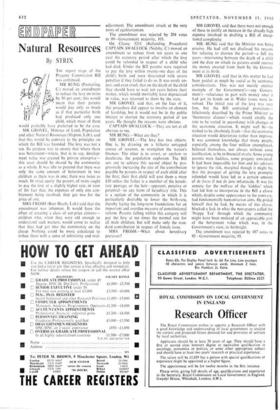Natural Resources
ER.DPA\PNE
By STRIX
THE report stage of the Progeny Commission Bill was continued.
MR BUNG (Pookering, C.) moved an amendment to reduce the levy on twins by 50 per cent; this would mean that their parents would pay only as much as if that particular birth had produced only one child, which most of them would probably have preferred to be the case.
MR GROVEL, Minister of Land, Population and other Natural Resources (Slapton, Lab.), said that this would be contrary to the principles on which the Bill was founded. The levy was not a tax. Its purpose was to ensure that where there was betterment—where, that is to say, develop- ment value was created by private enterprise— this asset should be shared by the community as a whole. It was idle to pretend that there was only the same amount of betterment in two children as there was in one; there was twice as much. In strict equity the parents of twins ought to pay the levy at a slightly higher rate, in view of the fact that, the expenses of only one con- finement being involved, they got two for the price of one.
MRS FROSH (Beer Heath, Lab.) said that the amendment was inhuman. It would have the effect of creating a class of cut-price citizens— children who, when they were old enough to understand such matters, would come to realise that they had got into the community on the cheap. Nothing could be more calculated to imbue them with a sense of inferiority and mal-
adjustment. The amendment struck at the very roots of egalitarianism.
The amendment was rejected by 204 votes to 99—Government majority, 103.
On Clause 3211 (Refunding Procedure) CAPTAIN SWALLOCK (Nidsby, C.) moved an amendment to reduce from ten years to one year the statutory period after which the levy could be refunded in respect of a child who had died. Under the Bill parents were required to pay the levy within twenty-one days of the child's birth and were threatened with severe penalties if they failed to do so. It was surely un- just, and even cruel, that on the death of the child they should have to wait ten years before their money, which would inevitably have depreciated in value, was returned to them by the state.
MR GROVEL said that, on the face of it, this procedure did appear to involve an element of hardship, but it would not be in the public interest to shorten the statutory period of ten years. He thought the reasons were obvious.
CAPTAIN SWALLOCK.—They are not at all obvious to me.
MR BUNG.—What are they?
MR GROVEL.—The levy has two objects. One is, by drawing on a hitherto untapped source of revenue, to strengthen the nation's finances. The other is to arrest, or anyhow to decelerate, the population explosion. The Bill sets out to achieve this second object by pro- gressively increasing the size of the contribution payable by parents in respect of each child after the first; their first child will cost them a mere flO unless the father is a member of the heredi- tary peerage, or the heir—apparent, putative or potential--to any form of hereditary title. This is a section of the community in which it is particularly desirable to lower the birth-rate, thereby laying the long-term foundations for an important and overdue measure of constitutional reform. Parents falling within this category will pay the levy at ten times the normal rate for all male children, but will make only the stan- dard contribution in respect of female issue.
MRS FROSH.—What about hereditary peeresses? MR GROVEL said that there were not enough of these to justify an increase in the already high expense involved in drafting a Bill of excep- tional complexity.
MR. BUNG said that the Minister was being evasive. He had still not disclosed his reasons for refusing to shorten the period—a full ten years—intervening between the death of a child and the date on which its parents could recover the money exacted from them by the Govern- ment at its birth.
MR GROVEL said that in this matter he had been guided as much by social as by economic considerations. This was not merely another example of the Government's—any Govern- ment's—reluctance to part with money once it had got its hands on it. Wider issues were in- volved. The initial rate of the levy was very low, but the Bill contained provisions— felicitously described by the Prime Minister as 'thermostat clauses'—which would enable the rate to be varied in accordance with changes in the economic situation. It might well be—he wished to be absolutely frank—that the economic situation would deteriorate rather than improve. It was common knowledge that many people, especially among the four million unemployed, believed themselves, not always without some justification, to be in financial straits. Some young parents were feckless, some progeny unwanted. It had been impossible for him and his advisers to ignore the risk, marginal though it might be, that the prospect of getting the levy promptly refunded would have led to a certain amount of de fuck, if not de jute infanticide. It was his anxiety for the welfare of the 'kiddies' which had led him to incorporate in the Bill a clause which, despite some appearances to the contrary, had fundamentally humanitarian aims. He prided himself that he had, by means of this clause, blocked a leak in what the newspapers called the 'Nappy Tax' through which the community might have been mulcted of an appreciable part of the betterment value which was, in the Government's view, its birthright.
The amendment was rejected by 187 votes to 92—Government majority, 95.






































 Previous page
Previous page